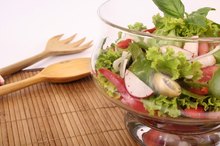What does fact checked mean?
At Healthfully, we strive to deliver objective content that is accurate and up-to-date. Our team periodically reviews articles in order to ensure content quality. The sources cited below consist of evidence from peer-reviewed journals, prominent medical organizations, academic associations, and government data.
- National Institute on Aging: Healthy Eating After 50
- American Dietetic Association: Eating Right During Menopause
- American Dietetic Association: Bone Health for Women
The information contained on this site is for informational purposes only, and should not be used as a substitute for the advice of a professional health care provider. Please check with the appropriate physician regarding health questions and concerns. Although we strive to deliver accurate and up-to-date information, no guarantee to that effect is made.
Recommended Calories for Women Over 50
Eating nutritiously can help you age well, allowing you to stay healthy and feel energized for everyday life. Women older than age 50 have different caloric needs than younger women. While your individual calorie requirements also depend on your size and activity level, basic calorie guidelines can help you figure out how much to eat each day.
As you age, your metabolism slows down and your muscle mass decreases, causing you to burn less calories. Menopause and hormonal changes can also lead to weight gain 2. Women older than age 50 therefore do not need as many calories as younger women. Weight gain is not inevitable as you age, however, as cutting your calories and increasing your activity level can ward off extra pounds.You may need about 200 fewer calories a day in your 50s than you did during your 30s and 40s, advises MayoClinic.com 2.
Guidelines
Your activity level will in part determine how many calories you need to consume each day. Your exact caloric needs also depend on your weight. In general, the more you weigh, the more calories you will burn each day.
Considerations
How Many Calories & Grams of Fat Should a Female Consume?
Learn More
Tufts University offers a modified version of the USDA MyPyramid for older adults. MyPyramid includes USDA guidelines on how much and what types of food to eat for a healthy, balanced diet. Since older adults should consume less calories than other adults, it is especially important to eat nutrient-dense foods.
Nutrition
It is important for women older than 50 to consider the type of calories they are eating. Senior women require a variety of nutrients to stay healthy, including more calcium to keep your bones strong and minimize bone loss with age. After age 50, women need at least 1,200 mg of calcium per day, the American Dietetic Association advises. Also, increase your vitamin D intake, which helps your body absorb calcium. Women older than 50 should consume 800 to 1,000 IU of vitamin D daily, recommends the ADA.
- It is important for women older than 50 to consider the type of calories they are eating.
- After age 50, women need at least 1,200 mg of calcium per day, the American Dietetic Association advises.
Related Articles
References
- National Institute on Aging: Healthy Eating After 50
- MayoClinic.com: Menopause Weight Gain: Stop the Middle Age Spread; September 2010
- Sharma HB, Kailashiya J. Gender difference in aerobic capacity and the contribution by body composition and haemoglobin concentration: a study in young indian national hockey players. J Clin Diagn Res. 2016;10(11):CC09–CC13. doi:10.7860/JCDR/2016/20873.8831
- Brightwell CR, Markofski MM, Moro T, et al. Moderate-intensity aerobic exercise improves skeletal muscle quality in older adults. Transl Sports Med. 2019;2(3):109–119. doi:10.1002/tsm2.70
- American College of Sports Medicine. Protein Intake for Optimal Muscle Maintenance.
- Bellemare F, Jeanneret A, Couture J. Sex differences in thoracic dimensions and configuration. American journal of respiratory and critical care medicine. 2003;168(3):305–12.
- Dilgate Muth, Nathalie, MD, MPH, RD. Do men and women have different nutritional needs? American Council on Exercise. March 21, 2012.
- Lewis D, Kamon E, Hodgson J. Physiological differences between genders. Implications for sports conditioning. Sports medicine (Auckland, N.Z.). 1986;3(5):357–69.
- Protein Intake for Optimal Muscle Maintenance, American College of Sports Medicine, (2015).
Resources
Writer Bio
Marnie Kunz has been an award-winning writer covering fitness, pets, lifestyle, entertainment and health since 2003. Her articles have been published in "The Atlanta Journal-Constitution," "Alive," "The Marietta Daily Journal" and other publications. Kunz holds a Bachelor of Arts in creative writing from Knox College and is a Road Runners Club of America-certified running coach and a certified pole dance instructor.









